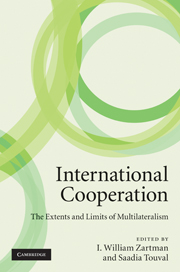Book contents
- Frontmatter
- Contents
- List of figures
- List of tables
- List of contributors
- Acknowledgements
- 1 Introduction: return to the theories of cooperation
- Part 1 Multilateral meanings of cooperation
- Part 2 Multiple strategies of cooperation
- 6 Synthesizing rationalist and constructivist perspectives on negotiated cooperation
- 7 The shadow of the past over conflict and cooperation
- 8 Chicken dilemmas: crossing the road to cooperation
- 9 Conflict management as cooperation
- 10 Status concerns and multilateral cooperation
- 11 Asymmetrical cooperation in economic assistance
- 12 Conclusion: improving knowledge of cooperation
- Bibliography
- Index
10 - Status concerns and multilateral cooperation
Published online by Cambridge University Press: 05 June 2012
- Frontmatter
- Contents
- List of figures
- List of tables
- List of contributors
- Acknowledgements
- 1 Introduction: return to the theories of cooperation
- Part 1 Multilateral meanings of cooperation
- Part 2 Multiple strategies of cooperation
- 6 Synthesizing rationalist and constructivist perspectives on negotiated cooperation
- 7 The shadow of the past over conflict and cooperation
- 8 Chicken dilemmas: crossing the road to cooperation
- 9 Conflict management as cooperation
- 10 Status concerns and multilateral cooperation
- 11 Asymmetrical cooperation in economic assistance
- 12 Conclusion: improving knowledge of cooperation
- Bibliography
- Index
Summary
Since the end of the Cold War, scholars and foreign policy analysts have debated the various strategies of global governance – institutionalized coordination of states' activities to achieve a stable, predictable, controlled, and non-violent international order – a subject that has become urgent since 9/11 and the wars in Afghanistan and Iraq. The key to securing such cooperation is to understand what induces other states to accept and internalize rules and norms proffered by the dominant power. In a system characterized by considerable power asymmetries, weaker states may resist being bullied or dominated by the hegemon.
Primacists have argued that US military and economic preponderance is so great that it is futile for other states to balance against American power, seemingly giving them no other choice but to pursue various accommodationist strategies (Sheetz 1997–98; Lemke 1997; Wohlforth 1999; Brooks and Wohlforth 2002, 2008). On the other hand, history suggests that complacency and imperial hubris are dangerous recipes for a long-term grand strategy in foreign affairs. States can impede the hegemonic power's global governance in numerous ways other than forming an opposing alliance or initiating a large-scale military buildup, including balking, feigned compliance, free riding, binding in international institutions, blackmail, or delegitimation of the hegemonic order (Walt 2005). The US rift with European allies over the war in Iraq suggests that unipolarity does not preclude anti-US collusion on major issues.
- Type
- Chapter
- Information
- International CooperationThe Extents and Limits of Multilateralism, pp. 182 - 207Publisher: Cambridge University PressPrint publication year: 2010
- 7
- Cited by



